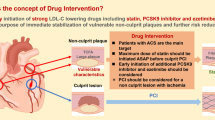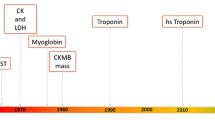Abstract
Purpose
Chlamydophila pneumoniae has been implicated in atherosclerosis/restenosis; however, clear evidence is missing. Therefore, the aim of our study was to examine the influence of intimal infection and systemic inflammation on cardiovascular complications after coronary intervention.
Methods
45 atheroma specimens from patients with symptomatic coronary artery disease who underwent directional endatherectomy with stent implantation were analyzed by immunohistochemistry to detect chlamydial (c) and human (h) heat shock protein (HSP) 60. The antibodies used against cHSP60 and hHSP60 were characterized by specificity and lack of cross immunoreactivity. In addition, serum Ig antibodies against Chlamydophila pneumoniae and against mycobacterial (m) HSP65 as well as serum CRP levels were measured. At follow-up of 6 months, quantitative coronary angiography was performed and major adverse cardiac events (MACE) were assessed.
Results
Atheroma specimens of all 10 patients with MACE were positive for cHSP60 with overall higher cHSP60 tissue expressions (1.1 ± 0.4 %) and serum CRP levels (2.18 ± 0.85 mg/dl) compared to the remaining 35 patients without MACE (7 of 35 specimens positive for cHSP60, mean cHSP60 expression: 0.4 ± 0.1 %, CRP levels: 0.67 ± 0.16 mg/dl, p < 0.05). Colocalization of both HSP60 homologues was more frequent in the MACE group. Anti-mHSP65 serum titers were significantly higher in MACE (1:510) versus non-MACE patients (1:335) and correlated positively with plaque expressions of cHSP60 and hHSP60 (r = 0.54, p < 0.05; r = 0.46, p < 0.05; resp.).
Conclusions
Intimal presence of cHSP60, systemic CRP and antibodies against mHSP65 are predictors for occurrence of MACE after coronary intervention.









Similar content being viewed by others
References
Ross R. Atherosclerosis—an inflammatory disease. N Engl J Med. 1999;340:115–26.
Elkind MS, Luna JM, Moon YP, Boden-Albala B, Liu KM, Spitalnik S, Rundek T, Sacco RL, Paik MC. Infectious burden and carotid plaque thickness: the northern Manhattan study. Stroke. 2010;41:e117–22.
Andrié RP, Bauriedel G, Tuleta I, Braun P, Nickenig G, Skowasch D. Impact of intimal pathogen burden in acute coronary syndromes—correlation with inflammation, thrombosis, and autoimmunity. Cardiovasc Pathol. 2010;19:e205–10.
Corrado E, Novo S. Role of inflammation and infection in vascular disease. Acta Chir Belg. 2005;105:567–79.
Rahel BM, Visseren FL, Suttorp MJ, Plokker TH, Kelder JC, de Jongh BM, Diepersloot RJ, Verkooyen RP, Bouter KP. Cytomegalovirus and Chlamydia pneumoniae as predictors for adverse events and angina pectoris after percutaneous coronary intervention. Am Heart J. 2004;148:670–5.
Elkind MS. Infectious burden: a new risk factor and treatment target for atherosclerosis. Infect Disord Drug Targets. 2010;10:84–90.
Fazio G, Giovino M, Gullotti A, Bacarella D, Novo G, Novo S. Atherosclerosis, inflammation and Chlamydia pneumoniae. World J Cardiol. 2009;1:31–40.
Kaufmann SH, Schoel B, van Embden JD, Koga T, Wand-Württenberger A, Munk ME, Steinhoff U. Heat-shock protein 60: implications for pathogenesis of and protection against bacterial infections. Immunol Rev. 1991;121:67–90.
Andrie RP, Bauriedel G, Braun P, Höpp HW, Nickenig G, Skowasch D. Prevalence of intimal heat shock protein 60 homologues in unstable angina and correlation with anti-heat shock protein antibody titers. Basic Res Cardiol. 2011;106:657–65.
Mayr M, Metzler B, Kiechl S, Willeit J, Schett G, Xu Q, Wick G. Endothelial cytotoxicity mediated by serum antibodies to heat shock proteins of Escherichia coli and Chlamydia pneumoniae: immune reactions to heat shock proteins as a possible link between infection and atherosclerosis. Circulation. 1999;99:1560–6.
Schumacher A, Lerkerød AB, Seljeflot I, Sommervoll L, Holme I, Otterstad JE, Arnesen H. Chlamydia pneumoniae serology: importance of methodology in patients with coronary heart disease and healthy individuals. J Clin Microbiol. 2001;39:1859–64.
Zebrack JS, Anderson JL. The role of infection in the pathogenesis of cardiovascular disease. Prog Cardiovasc Nurs. 2003;18:42–9.
Jahromi BS, Hill MD, Holmes K, Hutchison S, Tucker WS, Chiu B. Chlamydia pneumoniae and atherosclerosis following carotid endarterectomy. Can J Neurol Sci. 2003;30:333–9.
Kannengiesser M, Kaltenbach M, Stille W, Reifart N, Haase J. Influence of doxycycline on clinical and angiographic outcome following percutaneous coronary intervention. J Interv Cardiol. 2004;17:447–53.
Yuan Y, Lyng K, Zhang YX, Rockey DD, Morrison RP. Monoclonal antibodies define genus-specific, species-specific, and cross-reactive epitopes of the chlamydial 60-kilodalton heat shock protein (hsp60): specific immunodetection and purification of chlamydial hsp60. Infect Immun. 1992;60:2288–96.
Boog CJ1, de Graeff-Meeder ER, Lucassen MA, van der Zee R, Voorhorst-Ogink MM, van Kooten PJ, Geuze HJ, van Eden W. Two monoclonal antibodies generated against human hsp60 show reactivity with synovial membranes of patients with juvenile chronic arthritis. J Exp Med. 1992;175:1805–10.
Tuleta I, Skowasch D, Peuster M, Nickenig G, Bauriedel G. Cells of primarily extravascular origin in neointima formation following stent implantation: coordinated expression of endothelial progenitor, dendritic and neural crest-derived cells. Cardiology. 2008;110:199–205.
Skowasch D, Jabs A, Andrié R, Dinkelbach S, Schiele TM, Wernert N, Lüderitz B, Bauriedel G. Pathogen burden, inflammation, proliferation and apoptosis in human in-stent restenosis. Tissue characteristics compared to primary atherosclerosis. J Vasc Res. 2004;41:525–34.
Fong IW, Chiu B, Viira E, Tucker W, Wood H, Peeling RW. Chlamydial heat-shock protein-60 antibody and correlation with Chlamydia pneumoniae in atherosclerotic plaques. J Infect Dis. 2002;186:1469–73.
Schiele F, Batur MK, Seronde MF, Meneveau N, Sewoke P, Bassignot A, Couetdic G, Caulfield F, Bassand JP. Cytomegalovirus, Chlamydia pneumoniae, and Helicobacter pylori IgG antibodies and restenosis after stent implantation: an angiographic and intravascular ultrasound study. Heart Vessels. 2002;16:137–45.
Carlsson J, Miketic S, Brom J, Ross R, Bachmann H, Tebbe U. Prior cytomegalovirus, Chlamydia pneumoniae or Helicobacter pylori infection and the risk of restenosis after percutaneous transluminal coronary angioplasty. Int J Cardiol. 2000;73:165–71.
Borel N, Summersgill JT, Mukhopadhyay S, Miller RD, Ramirez JA, Pospischil A. Evidence for persistent Chlamydia pneumoniae infection of human coronary atheromas. Atherosclerosis. 2008;199:154–61.
Fagerberg B, Gnarpe J, Gnarpe H, Agewall S, Wikstrand J. Chlamydia pneumoniae but not cytomegalovirus antibodies are associated with future risk of stroke and cardiovascular disease: a prospective study in middle-aged to elderly men with treated hypertension. Stroke. 1999;30:299–305.
Hayashida K, Tanaka M, Morita H, Hayashi F, Inada T, Suzuki H, Sakamoto T, Katsuragawa M, Hibino H, Kambara H. Chlamydia pneumoniae seropositivity predicts the risk of restenosis after percutaneous transluminal coronary angioplasty. Am Heart J. 2002;144:491–500.
Blessing E, Campbell LA, Rosenfeld ME, Kuo CC. Chlamydia pneumoniae and hyperlipidemia are co-risk factors for atherosclerosis: infection prior to induction of hyperlipidemia does not accelerate development of atherosclerotic lesions in C57BL/6J mice. Infect Immun. 2002;70:5332–4.
Li L, Messas E, Batista EL Jr, Levine RA, Amar S. Porphyromonas gingivalis infection accelerates the progression of atherosclerosis in a heterozygous apolipoprotein E-deficient murine model. Circulation. 2002;105:861–7.
Hu H, Pierce GN, Zhong G. The atherogenic effects of chlamydia are dependent on serum cholesterol and specific to Chlamydia pneumoniae. J Clin Investig. 1999;103:747–53.
Lin FY, Lin YW, Huang CY, Chang YJ, Tsao NW, Chang NC, Ou KL, Chen TL, Shih CM, Chen YH. GroEL1, a heat shock protein 60 of Chlamydia pneumoniae, induces lectin-like oxidized low-density lipoprotein receptor 1 expression in endothelial cells and enhances atherogenesis in hypercholesterolemic rabbits. J Immunol. 2011;186:4405–14.
Horne BD, Muhlestein JB, Strobel GG, Carlquist JF, Bair TL, Anderson JL, Intermountain Heart Collaborative (IHC) Study Group. Greater pathogen burden but not elevated C-reactive protein increases the risk of clinical restenosis after percutaneous coronary intervention. Am Heart J. 2002;144:491–500.
Kol A, Sukhova GK, Lichtman AH, Libby P. Chlamydial heat shock protein 60 localizes in human atheroma and regulates macrophage tumor necrosis factor-α and matrix metalloproteinase expression. Circulation. 1998;98:300–7.
Kol A, Bourcier T, Lichtman AH, Libby P. Chlamydial and human heat shock protein 60 s activate human vascular endothelium, smooth muscle cells, and macrophages. J Clin Investig. 1999;103:571–7.
Zhang Y, Xiong Q, Hu X, Sun Y, Tan X, Zhang H, Lu Y, Liu J. A novel atherogenic epitope from Mycobacterium tuberculosis heat shock protein 65 enhances atherosclerosis in rabbit and LDL receptor-deficient mice. Heart Vessels. 2012;27:411–8.
Jousilahti P, Salomaa V, Rasi V, Vahtera E, Palosuo T. The association of c-reactive protein, serum amyloid a and fibrinogen with prevalent coronary heart disease—baseline findings of the PAIS project. Atherosclerosis. 2001;156:451–6.
Ridker PM, Hennekens CH, Buring JE, Rifai N. C-reactive protein and other markers of inflammation in the prediction of cardiovascular disease in women. N Engl J Med. 2000;342:836–43.
Conflict of interest
On behalf of all the authors, the corresponding author states that there is no conflict of interest.
Author information
Authors and Affiliations
Corresponding author
Rights and permissions
About this article
Cite this article
Tuleta, I., Reek, D., Braun, P. et al. Influence of intimal Chlamydophila pneumoniae persistence on cardiovascular complications after coronary intervention. Infection 43, 51–57 (2015). https://doi.org/10.1007/s15010-014-0694-1
Received:
Accepted:
Published:
Issue Date:
DOI: https://doi.org/10.1007/s15010-014-0694-1




